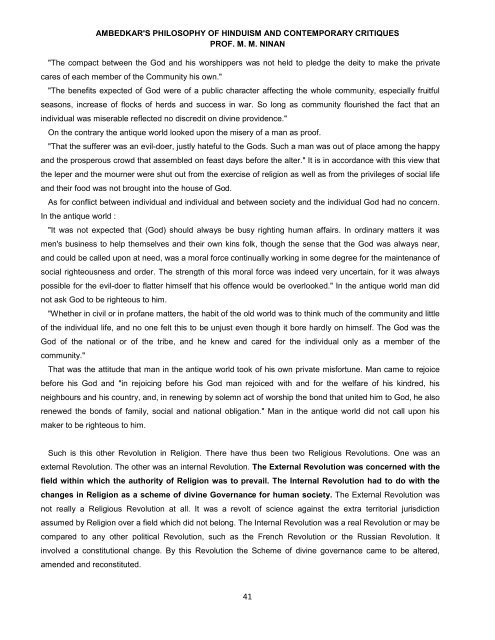Ambedkar-Philosophy of Hinduism
Create successful ePaper yourself
Turn your PDF publications into a flip-book with our unique Google optimized e-Paper software.
AMBEDKAR'S PHILOSOPHY OF HINDUISM AND CONTEMPORARY CRITIQUES<br />
PROF. M. M. NINAN<br />
"The compact between the God and his worshippers was not held to pledge the deity to make the private<br />
cares <strong>of</strong> each member <strong>of</strong> the Community his own."<br />
"The benefits expected <strong>of</strong> God were <strong>of</strong> a public character affecting the whole community, especially fruitful<br />
seasons, increase <strong>of</strong> flocks <strong>of</strong> herds and success in war. So long as community flourished the fact that an<br />
individual was miserable reflected no discredit on divine providence."<br />
On the contrary the antique world looked upon the misery <strong>of</strong> a man as pro<strong>of</strong>.<br />
"That the sufferer was an evil-doer, justly hateful to the Gods. Such a man was out <strong>of</strong> place among the happy<br />
and the prosperous crowd that assembled on feast days before the alter." It is in accordance with this view that<br />
the leper and the mourner were shut out from the exercise <strong>of</strong> religion as well as from the privileges <strong>of</strong> social life<br />
and their food was not brought into the house <strong>of</strong> God.<br />
As for conflict between individual and individual and between society and the individual God had no concern.<br />
In the antique world :<br />
"It was not expected that (God) should always be busy righting human affairs. In ordinary matters it was<br />
men's business to help themselves and their own kins folk, though the sense that the God was always near,<br />
and could be called upon at need, was a moral force continually working in some degree for the maintenance <strong>of</strong><br />
social righteousness and order. The strength <strong>of</strong> this moral force was indeed very uncertain, for it was always<br />
possible for the evil-doer to flatter himself that his <strong>of</strong>fence would be overlooked." In the antique world man did<br />
not ask God to be righteous to him.<br />
"Whether in civil or in pr<strong>of</strong>ane matters, the habit <strong>of</strong> the old world was to think much <strong>of</strong> the community and little<br />
<strong>of</strong> the individual life, and no one felt this to be unjust even though it bore hardly on himself. The God was the<br />
God <strong>of</strong> the national or <strong>of</strong> the tribe, and he knew and cared for the individual only as a member <strong>of</strong> the<br />
community."<br />
That was the attitude that man in the antique world took <strong>of</strong> his own private misfortune. Man came to rejoice<br />
before his God and "in rejoicing before his God man rejoiced with and for the welfare <strong>of</strong> his kindred, his<br />
neighbours and his country, and, in renewing by solemn act <strong>of</strong> worship the bond that united him to God, he also<br />
renewed the bonds <strong>of</strong> family, social and national obligation." Man in the antique world did not call upon his<br />
maker to be righteous to him.<br />
Such is this other Revolution in Religion. There have thus been two Religious Revolutions. One was an<br />
external Revolution. The other was an internal Revolution. The External Revolution was concerned with the<br />
field within which the authority <strong>of</strong> Religion was to prevail. The Internal Revolution had to do with the<br />
changes in Religion as a scheme <strong>of</strong> divine Governance for human society. The External Revolution was<br />
not really a Religious Revolution at all. It was a revolt <strong>of</strong> science against the extra territorial jurisdiction<br />
assumed by Religion over a field which did not belong. The Internal Revolution was a real Revolution or may be<br />
compared to any other political Revolution, such as the French Revolution or the Russian Revolution. It<br />
involved a constitutional change. By this Revolution the Scheme <strong>of</strong> divine governance came to be altered,<br />
amended and reconstituted.<br />
41


















